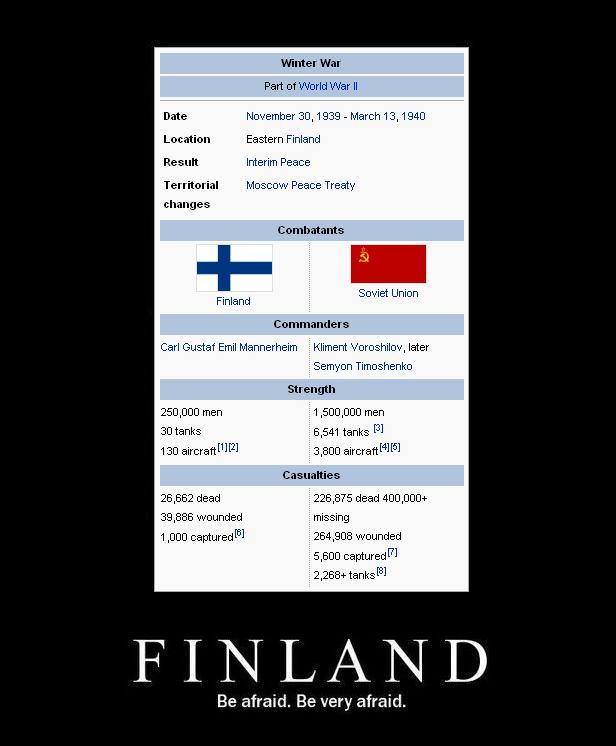It depends a lot on where we stand as is. Not a lot of information is given right now so it depends on other variables:The Cheezy One said:Assume you have one hundred soldiers, completed basic training and equipped with standard issue weaponry, and are fighting one hundred generic enemy soldiers in a generic environment. You can improve one aspect of the upcoming fight:
What kind of Intel do we have as of right now?The Cheezy One said:Intel
You can learn more about the enemy strengths and weaknesses.
Do we have any kind of basic intel? Do we know who the enemy is, and whether or not they're going to fight us with a similar force? Or do we have absolutely no idea whether they're sending a junkie with a pocket knife or an entire world's worth of troops, tanks and whatever else they can grab.
If we have 0 intel (we just know we're going to be attacked), then give me intel first and foremost. I know what we have, even if what we have sucks, now I need to have an idea of what they have to see if there's any point fighting or if we might as well leg it.
How "basic" is their basic training, and how much would this training improve them?The Cheezy One said:Training
Advance your soldiers past basic training, make them ready for anything that could happen
Are we talking about "saturday morning villain grunts" that are a step bellow storm trooper in the original trilogy? Would this extra training basically turn them into Warhammer 40k's space marines or 300's Spartans where each single man is worth an army? Then this becomes very important, maybe the most important depending on Intel. An army that can't fight isn't an army, it's target practice.
On the other hand, if by "basic training" you mean "basic military training" where individuals are very competent soldiers, just not specialized in anything in particular, then this isn't as important.
What weaponry do they have? What weaponry would be available?The Cheezy One said:Equipment
Allow your soldiers to choose thier own weaponry
Are they fighting with sticks and stones and can choose anything from AK47s and M16s to Steyr Augs, P90s, AA-12s? If they're egregiously under-equipped then there's no point getting more or better soldiers if they have nothing to fight with. If they have decent weaponry (like, standard issue M16s or M4A2s) then it's not that as pressing an issue.
What kind of supplies do we already have? How long do we expect to fight?The Cheezy One said:Supplies
Your soldiers have enough medical supplies and ammunition to last for months
If we have no supplies at all and expect to fight in "siege" mode, the previous point applies. What's the point of having great guns or more soldiers if they'll starve to death by the end of the week? Do we, on the other hand, have limited but sufficient supplies to last through the conflict we're expecting if we ration them? Then this is more of a commodity than anything.
What kind of enemy are we facing?The Cheezy One said:Numbers
Gain an extra one hundred soldiers
If we're fighting 100 enemy soldiers, doubling up our forces might be sufficient to end the conflict swiftly with our victory. If, on the other hand, we're already outnumbering the enemy, or if we remain outnumbered, then doubling our numbers becomes less important than, say, getting better equiped or trained soldiers.
What kind of artillery do we have? What kind of artillery can we request? What kind of enemy are we fighting? What kind of terrain are we fighting on?The Cheezy One said:Support
Artillery, bombing run, trebuchet, anything that does not actually enter the battlefield, like a tank or helicopter would
We have nothing at all, and are fighting outnumbered and outgunned, then give me a well timed B2 carpet bombing to level out half the enemy army or more. Sustained artillery fire can be instill fear in your enemies, but it depends on how effective they can be.
On top of this we have to consider what kind of time period and fighting you're referring to (for instances, artillery becomes less effective once you consider heavy melee-based fight, as friendly fire would negate a lot of it's effectiveness).
There's a LOT of information one needs to take into account before making such a decision. It's never a clear cut "this is always better!". It's all situational.


